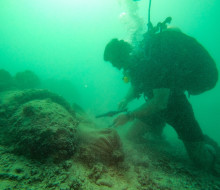
Second World War-era bombs in Vanuatu made safe by Navy divers
26 June 2024
Unfortunately you are viewing this website on an outdated browser which does not support the necessary features for us to provide an adequate experience. Please switch to a modern browser such as latest version of Google Chrome, Mozilla Firefox, Apple Safari or Microsoft Edge.
Ngā mihi nui
Rotorua’s Sarah Podmore has no shortage of challenges in her day job as a paramedic for Hato Hone St John. But she pushes herself even further as an infantry soldier in the New Zealand Army Reserve Force.
Private Podmore, 31, competes in powerlifting in her spare time, and says that until you’ve been pushed through mental and physical boundaries, you don’t realise your capabilities.
As a paramedic and clinical support officer, she dispatches rescue helicopters, performs paramedic duties and mentors and educates staff.
“One day I'm in the communications centre assessing emergency calls from throughout the motu for any incidents that could require a helicopter dispatch.
“Another day I'll be in the classroom or simulation suite getting interns ready for their practical exams, and the next, on the road doing my regular paramedic job of treating patients and coaching staff.”
Not shy of a challenge, Private Podmore joined the Reserve Force in 2017. She’s a member of 3rd/6th Battalion and normally attends Hauraki Company training in Tauranga.
The challenges of soldiering can be more physical, she said.
“There will be training days when you'll be fighting up a hill or through some bush with the lads, and your corporal will run the drill for what feels like a hundred times.
“You'll be on your guts with your rifle, gasping for air and your legs burning, praying that your mates can't hear you wheezing, and you'll think there's not a chance you've got anything left in the tank, but the corporal will run it again.
“You get up. Every damn time you get up, you keep going and you finish the job. Next thing you know you've done it several more times, and whaddaya know, you're still standing, still breathing and still alive.
“That lesson is the true value of infantry training. Most people stop well before they've truly gassed out. You don't get that option here and it did me a world of good across all parts of my life to actually know that I could show up and do the hard thing.”
She said although it was tough training, section members encourage one another and use the strengths within the team to help develop self-confidence, motivation and determination.



Left and right: Private Sarah Podmore takes part in a close-country training. Middle: As a paramedic for Hato Hone St John, Private Podmore (right) helps trainee paramedics pass their internships
“A platoon sergeant once rallied us by saying to take out the enemy with ‘tenacity and efficiency’,” Private Podmore said.
“Although in a different context, I now dispatch emergency helicopters with that same concept in mind, recognising that our patients may have a limited time for survival.
“I’m really glad I became a Reserve Force infantry soldier. We build amazing friendships and I’ve learned good life lessons. I’ve found this training has really taught me about myself and that’s moved across to my civilian life and employment.
“The Army has exposed me to leadership at a variety of levels and I’ve been able to reflect on those experiences and channel that into my St John work.”
Hato Hone St John had always supported her commitment to the Reserve Force, Private Podmore said.
“The training does entwine but also offers different challenges and growth that I can incorporate into both sections of my life.”
Any Defence Recruiting enquiries can be directed to 0800 1 FORCE. Each Reserve Force company has its own training programme in line with its battalion’s training focus. Company level training typically occurs one weekend a month, with platoon-level training one night a week.